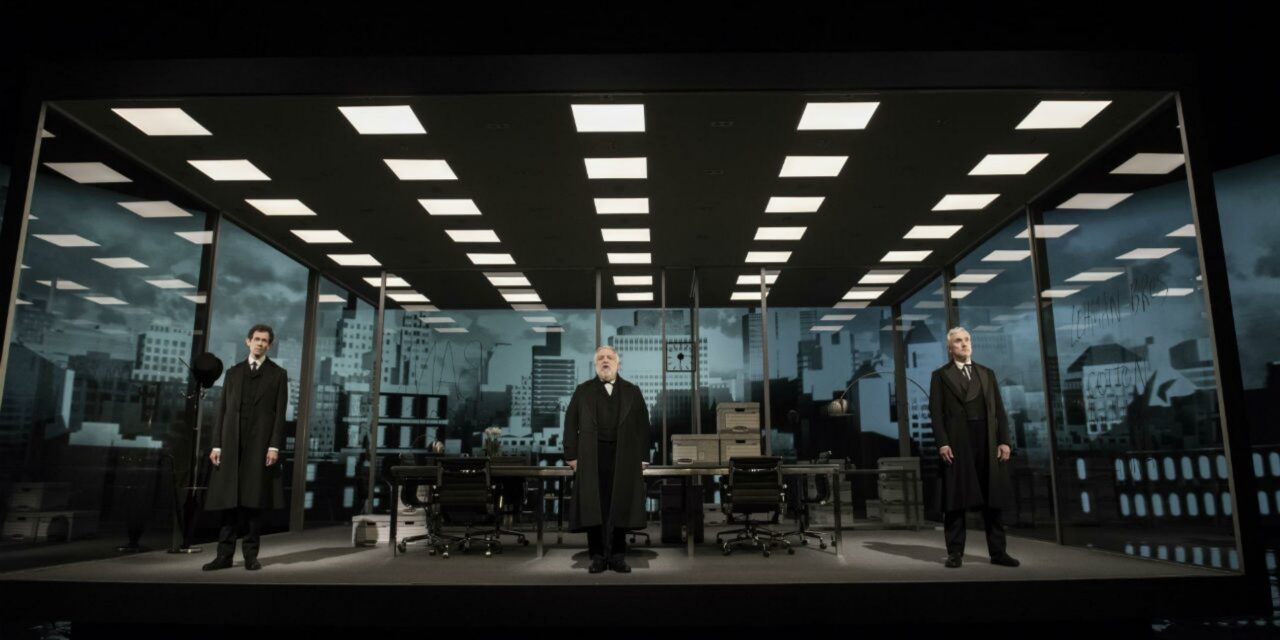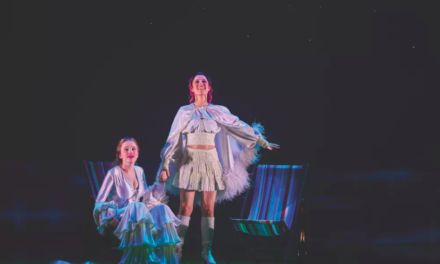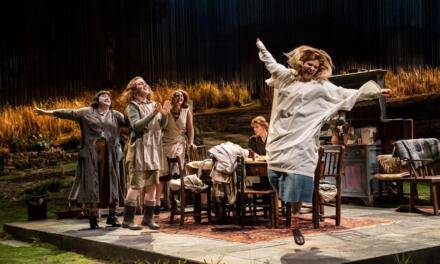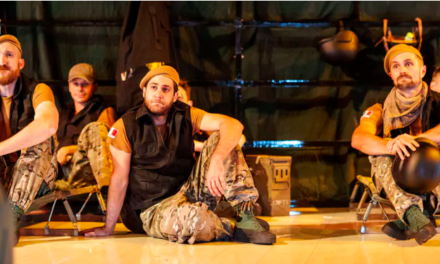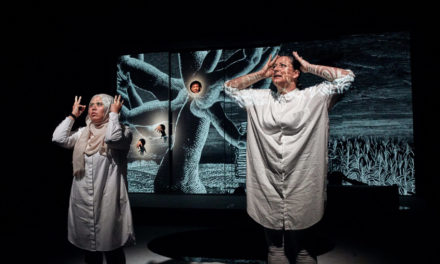Three generations, three centuries, three acts: The Lehman Trilogy is a theatrical feast that comes in threes, but it enchants one with a remarkably unified, indivisible force. Adapted by Ben Power from Stefano Massini’s 2012 play in Italian, it chronicles the rise and fall of Lehman Brothers, from Henry Lehman’s 1844 arrival in New York from Bavaria to the firm’s bankruptcy in 2008. A chronicle it is, but the documentarian instinct is one of many vectors at play in this blazingly inventive account of that turbulent period. Shouldered entirely by three magnificent actors, this epic saga of rags to riches (and all the way back) captures an extraordinary degree of multivocality in its lyrical and psychological exploration of what it means to succeed and fail, what it takes to adapt to changing exigencies or to stick to one’s principles—as a business, as a family, and as a nation.
Sam Mendes stages this roller coaster ride of a play in a revolving glass cube designed by Es Devlin; within this modest but smart structure are three compartments of a contemporary office, which provide the setting for the entirety of the action. The opening moment, set in 2008, signals clearly that this is where Lehman Brothers’ story will reach its tragic conclusion; so we watch the whole journey unfold in the material space that marks its destination. The proleptic force of this choice is tangible throughout, which also manifests itself in the third-person authorial voice used by all three of the actors as they tread their way through the story. Indispensable to this world are Luke Halls’ astonishingly evocative projections that constitute a constantly active background, registering abrupt changes in setting, mood, and perspective with clarity. In this, there is also strong support by Jon Clark’s patiently dynamic lighting and Nick Powell’s nimble and expansive sound design, including live piano accompaniment. It is very hard indeed to imagine this play realized on stage in any other way—such is the extent of precision and harmony that reign supreme over its numerous design elements. An uncanny clockwork, if you will.
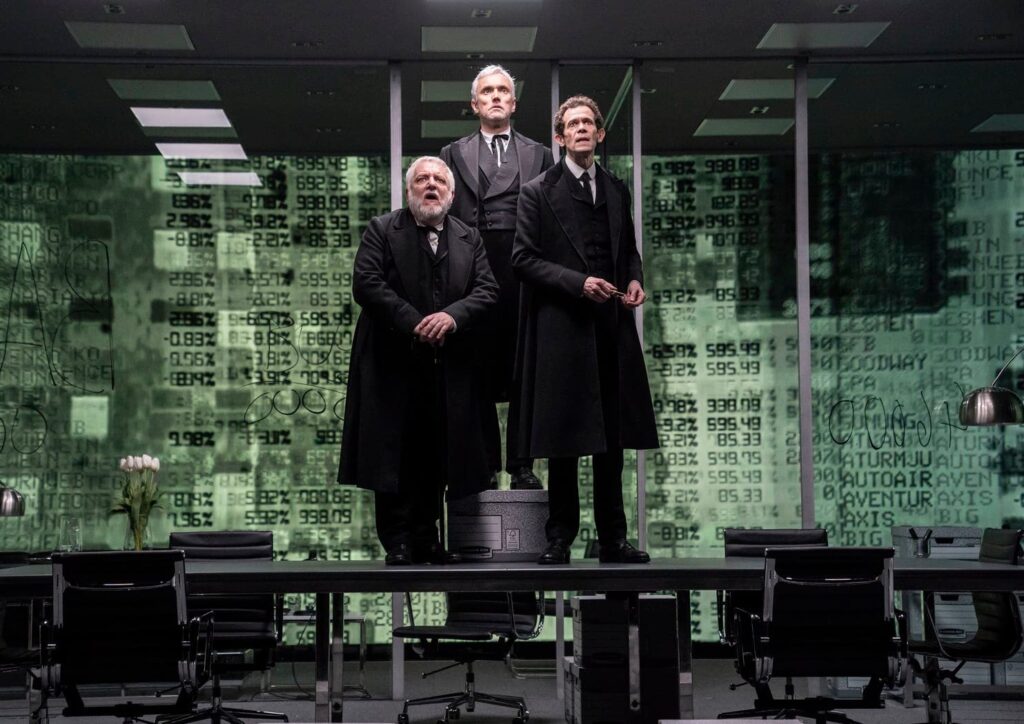
Simon Russell Beale, Ben Miles, and Adam Godley in The Lehman Trilogy. Photo: Stephanie Berger
But this is only a part of what makes this production’s wheels run so smoothly. Simon Russell Beale, Adam Godley, and Ben Miles are simply excellent in their adaptable, confident, and euphonious interpretations of over fifty characters. When we first meet them, they are the three Lehman brothers at the estranged origins of what will ultimately become an investment bank. But soon enough, they start to take on the voices of others that belong to their story, regardless of how prominently. So gesture by gesture, character by character, they weave an awe-inspiring fabric that encompasses the large and the small, the trivial and the consequential, the witty and the somber. This challenging but generous mode of storytelling allows us to follow a complex and sprawling narrative with equal measures of depth and breadth. Once we get into the swing of the play’s restless dramaturgy, it becomes a joy—slightly exhausting at times but perpetually riveting—to follow these three masterful actors wherever they go. No one is off limits: wives, children, business partners, and mere acquaintances are all part of the astounding range of characters embodied by them, even if fleetingly. Their energy, their commitment, never lags. They simultaneously narrate the events as outsiders and experience them as participants. At once critically detached commentators and deeply invested agents, the actors continually straddle multiple lines, pay due respect to multiple allegiances.
No less impressive is their deeply choreographic blocking: every single moment can be said to form a searing tableau, even as it may lead to the next one in moments of fast-paced movement. The actors stand on tables, crawl under sofas, and push each other on office chairs. With black markers in their hands, they write on glass walls the ever-changing names of the company in a ritual of self-renewal and progress. Picked up and thrown around by them, the archive boxes that abound on the stage variously become chess pieces, building blocks, talismans, stepping-stones. Just as in children’s games, much magic is created out of the seemingly prosaic. In fact, as the boxes have their narrative source in the firm’s closing down, the magic is occasioned by the tragic finality of the story itself, as though the retrospective look could not have been captured—and channeled into a narrative—without being anchored in these sad markers of (en)closure. The imaginative limits of this dramatic world are positively imperceptible: it generates and feeds on a haunting sense of primal theatricality.
Sam Mendes’ meticulous and daring vision, propped by Ben Power’s piercing adaptation of the original text into this compact and compelling version, makes itself apparent in every nook and cranny of this production without any ostentation. This is, in other words, as much a directorial tour de force as it is an actorly one, for the nature of the ride we are taken on is both complex and demanding, and it could have easily crumbled to pieces in less capable hands. Historically and thematically, the play’s range is formidable. Just as Lehman Brothers draws an unpredictable trajectory from selling raw cotton to investing in railways to trading stocks (with dozens of other engagements sprinkled throughout), the play itself evolves considerably as a malleable (but never loose) meditation on Jewish identity, immigration, capitalism, and—of course—family. True to life, these sites of selfhood and collectivity, ever allied with anxiety and change, are not tackled in siloes but beautifully enmeshed, their inextricable togetherness made clear. The Lehmans’ initial successes, for instance, cannot be conceived apart from their strong ties to one another and to their faith. The gradual loosening of those ties, in turn, is partially triggered by the rampaging socio-economic pressures of the Great Depression. Sure, business is business, but in this play, it is also family, faith, identity.
If The Lehman Trilogy is a master class in theatre—and it is—then much of its achievement lies in its sublime orchestration of the resources available to it. It is one of those rare productions where everything comes together in a way that sets a new standard for successful artistic collaboration. In the spirit of Percy Bysshe Shelley’s great poem “Ozymandias,” nothing may remain today of the formerly glorious, the once-invincible Lehmans, but the work that tells of that vanishing act soars triumphantly, sure to leave a firm imprint on anyone who encounters it.
This post was written by the author in their personal capacity.The opinions expressed in this article are the author’s own and do not reflect the view of The Theatre Times, their staff or collaborators.
This post was written by Mert Dilek.
The views expressed here belong to the author and do not necessarily reflect our views and opinions.

